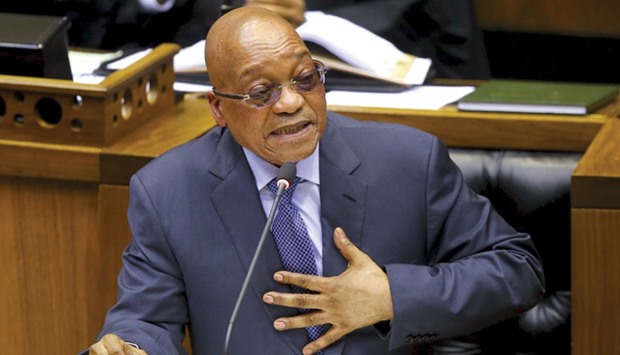
Zuma: Taking part in a top-level ANC meeting to discuss the court ruling.
President Jacob Zuma flouted the constitution in using public funds to upgrade his private residence and must repay the money, South Africa’s top court ruled yesterday, sparking calls for his impeachment.
The unanimous ruling by the 11-judge Constitutional Court, a central pillar of the democracy established at the end of apartheid, delivered a damning verdict on Zuma’s conduct after a swimming pool, chicken run, cattle enclosure and amphitheatre were built at his rural homestead as so-called “security” measures.
The president had refused an ombudswoman’s orders to repay money spent on the upgrades, which became a symbol of alleged corruption and greed within the ruling African National Congress (ANC) party.
Zuma “failed to uphold, defend and respect the constitution as the supreme law of the land”, Chief Justice Mogoeng Mogoeng said in a strongly-worded judgment.
The unprecedented rebuke came as Zuma fights back against separate allegations that a wealthy Indian family influenced ministerial appointments in a scandal that has rocked his government.
Zuma has also been battered by the country’s sharply declining economy.
But he retains a strong grip on parliament through his dominant leadership of the ANC, and any impeachment bid looked unlikely to succeed.
Public Protector Thuli Madonsela, the country’s ombudswoman, ruled in 2014 that Zuma had “benefited unduly” from the work on the Nkandla property in KwaZulu-Natal province, and that he should re-fund some of the money.
The president reacted by ordering two government investigations that cleared his name – including a report by the police minister which concluded that the swimming pool was a fire-fighting precaution.
Mogoeng said yesterday that Zuma “must personally pay the amount determined by the national treasury”.
The work was valued in 2014 at 216mn rand (then $24mn).
Mogoeng gave the Treasury 60 days in which to determine their “reasonable cost”, after which Zuma would have a further 45 days to pay.
Early estimates of the costs were 10mn rand ($680,000), Madonsela said.
Besides hurting Zuma, the ruling is a vindication for the soft-spoken but steely lawyer described by Mogoeng as “the embodiment of the Biblical David” fighting against the Goliath of state corruption.
“The office of the Public Protector is one of the true crusaders and champions of anti-corruption and clean governance,” Mogoeng said. “Hers are indeed very wide powers that leave no lever of government power above scrutiny.”
“President Jacob Zuma’s action amounts to a serious violation of the Constitution, and constitutes grounds for impeachment,” the Democratic Alliance (DA), South Africa’s main opposition party, said.
It added that it had officially begun the process to impeach Zuma.
But the ANC controls parliament after winning elections in 2014, and Zuma easily survived a no-confidence vote earlier this month.
A successful vote to impeach Zuma would require a two-thirds majority in the assembly.
The DA brought the case to court along with the far-left Economic Freedom Fighters (EFF) party.
“We call on the president to step down with immediate effect,” EFF leader Julius Malema said. “We would call upon the ANC to do the right thing and recall the president.”
Opposition parties hope yesterday’s ruling will bring gains in local elections this year, as frustration grows over 25% unemployment and grinding poverty for many black people more than 20 years after the end of apartheid.
Zuma has recently endured renewed corruption allegations after deputy finance minister Mcebisi Jonas said he was offered a promotion by the Guptas, an Indian business family said to hold huge sway over the president.
The president has faced growing criticism since he sacked two finance ministers within days in December, triggering a collapse in the rand and a major withdrawal of foreign investors.
“He enjoys less power inside the ANC than he did before firing the finance ministers in December,” Aubrey Matshiqi, analyst at the Helen Suzman Foundation, told AFP. “But the erosion in power he has suffered is not sufficient and does not constitute a direct threat yet to his position.”
Zuma, 73, will have completed two terms in 2019 and is not eligible to run for president again.
But the ANC, which led the fight against white-minority rule and has ruled since Nelson Mandela became president in 1994, could replace him ahead of the vote.
Zuma issued a brief statement saying that he respected the court’s decision, while senior ANC figures were due to meet to discuss its implications.
The ANC called an emergency meeting of its “Top Six” leaders – who include Zuma – to discuss the “serious nature” of the court’s findings.
“The Constitutional Court has restored hope in the constitutional dream for a man on the street to hold the government accountable,” Public Protector Madonsela said after the ruling.
“It’s a major decision that is going to have a significant impact on our political environment,” said Gary van Staden, political analyst at NKC African Economics. “In most other places in the world it would be terminal for President Zuma but we will have to wait and see how the balance of forces are playing out in the ANC.”
As president, Zuma’s annual salary is 2.7mn rand ($183,000).
If any payments are made on his behalf, they would be liable for income tax at 41%.
Last month, Zuma’s legal team admitted they were worried about political fallout from the case in mid-year provincial elections, urging the court not to wander too far from its explicitly legal mandate.
“This is a delicate time in a dangerous year,” his lawyer, Jeremy Gauntlett, told the court. “It will be wrong if this court makes a ruling which may result in a call for impeachment.”
